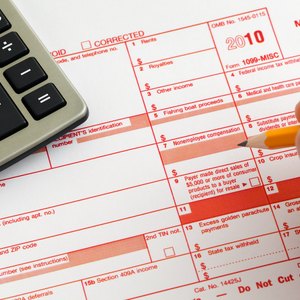
The federal income tax laws apply to everyone regardless of age, including minor children. If a minor has an account that pays interest, the child might receive a Form 1099-INT reporting that income for tax purposes. Depending on the amount of interest and the child’s other income, a minor might have to file a tax return, including the income reported on the Form 1099-INT. Typically, even children are responsible for filing their own return, but if the child isn’t able to do it themselves, the parent or legal guardian is required to file the return for the child. But, in some cases, that income might be eligible to be included on a parent’s tax return so that the child doesn’t have to file a separate return.
Tips
Since all qualifying individuals must file a tax return regardless of their age, a minor may be required to file Form 1099-INT if they receive more than $10 of interest income during the year.
When Form 1099-INT is Issued
The IRS requires that financial institutions issue a Form 1099-INT any time a client receives $10 or more of interest income during the year, regardless of the client’s age. The Form 1099-INT is sent to both the person who received the interest and the IRS so that the IRS can cross-reference tax returns to make sure all of the income is being reported correctly.
When Dependents Must File a Return
Most minors are claimed as a dependent on their parents’ income tax return. When someone is claimed as a dependent, that person is required to file an income tax return for himself or herself if unearned income, earned income or total income exceeds certain thresholds. For the 2017 tax year, dependents were required to file a return if unearned income for the year exceeds $2,600, earned income exceeds $7,900 or gross income exceeds the larger of $2,600 or earned income plus $1,900. For example, if a minor only had $50 in interest income, he wouldn’t need to file an income tax return, even though he would receive a Form 1099-INT. However, if the minor also had $3,000 of earned income from a summer job, then he would have to file a tax return.
Option to Include on Parental Tax Return
If the minor child meets certain criteria, the child’s parent can include the child’s interest income on his or her return, instead of having the child file a separate return. To be eligible, the child must be under 19 years old at the end of the year, or a full-time student and under 24 years old at the end of the year. Second, the child’s only income must be from interest and dividends. Third, the child’s income can’t exceed the filing threshold, which is $10,500 for 2017. Fourth, the child can’t be filing a joint return for the year. Fifth, no estimated tax payments can have been made on the child’s behalf, and no federal income taxes can have been withheld from the interest income under backup withholding.
References
- IRS: Publication 17 -- Your Federal Income Tax
- IRS: Topic Number 403 - Interest Received
- National Financial Educators Council. "Why Isn't Personal Finance Taught in School?" Accessed July 14, 2020.
- FINRA. "2018 National Financial Capability Study," Page 34. Accessed July 14, 2020.
- Internal Revenue Service. "Qualifying Child Rules." Accessed July 14, 2020.
- U.S. Congress. "Tax Cuts and Jobs Act," Page 29. Accessed July 14, 2020.
- Internal Revenue Service. "Credits & Deductions for Individuals." Accessed July 14, 2020.
- Internal Revenue Service. "2019 Publication 929: Tax Rules for Children and Dependents," Pages 3-7. Accessed July 14, 2020.
- Internal Revenue Service. "2019 Publication 929: Tax Rules for Children and Dependents," Page 10. Accessed July 14, 2020.
- Internal Revenue Service. "Claiming Exemption from Withholding for Employers." Accessed July 14, 2020.
- Internal Revenue Service. "About Form 1040-EZ, Income Tax Return for Single and Joint Filers With No Dependents." Accessed July 14, 2020.
- Internal Revenue Service. "Form 1040." Accessed July 14, 2020.
- Internal Revenue Service. "Self-Employed Individuals Tax Center." Accessed July 14, 2020.
- Social Security Administration. "Social Security Credits." Accessed July 14, 2020.
- Internal Revenue Service. "Individual Retirement Arrangements (IRAs)." Accessed July 14, 2020.
- Internal Revenue Service. "2019 Publication 929: Tax Rules for Children and Dependents," Pages 7–8. Accessed Dec. 5, 2019.
- Internal Revenue Service. "2019 Publication 929: Tax Rules for Children and Dependents," Pages 10–11. Accessed July 14, 2020.
Writer Bio
Based in the Kansas City area, Mike specializes in personal finance and business topics. He has been writing since 2009 and has been published by "Quicken," "TurboTax," and "The Motley Fool."

